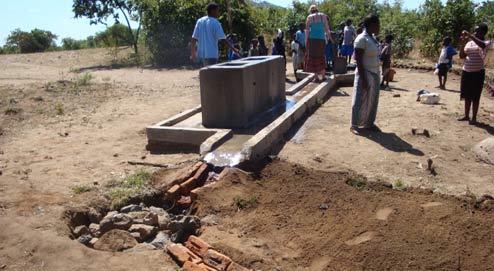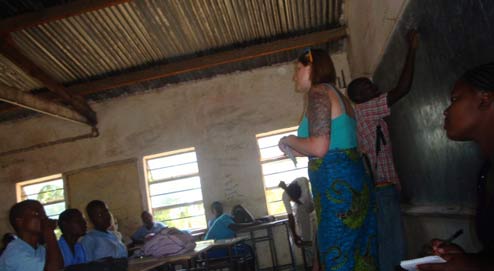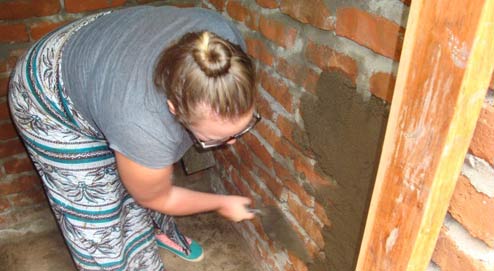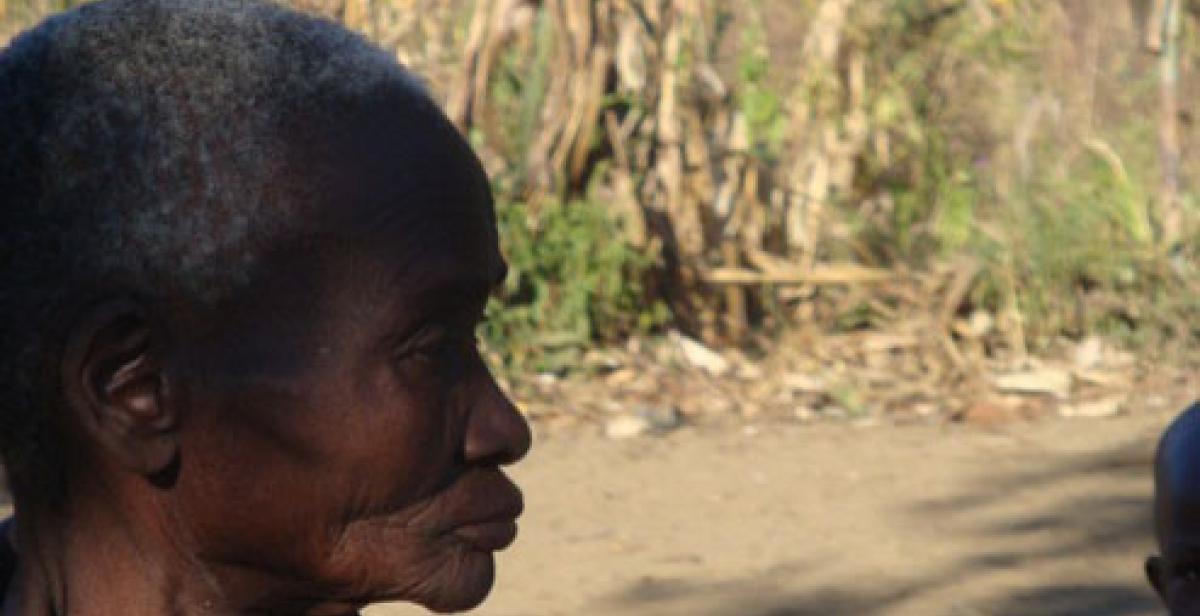Team Blantyre can hardly believe that we are now well into the second half of our placement and are determined, now more than ever, to achieve all the targets set for us.
The last two weeks have been focused primarily on borehole renovation and further teaching at local schools. We renovated boreholes at several schools in the area, but most notably Mdeka CDSS and Libuda Primary. These two boreholes were in particularly bad condition, owing largely to the fact that there was nobody to take proper care of them. The drainage pit and outflowing channel at both boreholes had merged to form a stagnant bog in which mosquitos and other unpleasant insects were able to reproduce and thrive. It was therefore very important that we fill in the bogs and dig new pits and channels for the water from the borehole to flow into. We did so, filling the pits with large stones and the channels with bricks. Doing this means that mosquitos will be unable to lay their eggs in the water. The learners at both schools were keen to be involved in the renovation process and it was fun being able to work with them.

At Libuda we were also able to address the issue of the borehole area not being maintained. We were informed that the school had their own Wash Club and we met with the group of around 20 learners, tasking them with looking after and maintaining the borehole and washing area. The message of good hygiene was then enforced further by the painting of a large mural on one of the walls of the school. Hundreds of learners came to watch and assist us and they greatly enjoyed having their hands painted and leaving their prints on the mural.
This fortnight also marked the start of our WASH lessons: Part 2. In these lessons we delivered more detailed information about water borne diseases, such as Cholera, Dysentery and Diarrhoea. Information regarding the causes, symptoms and treatment of said diseases was covered, with particular emphasis given to the importance of good personal hygiene to prevent the spread of these illnesses.

Life Planning lessons were also taught at the schools. In these lessons learners were taught about the equality that exists amongst all humans, regardless of colour or gender. They were then asked to tell us what they aspired to be when they were older, to which a wide range of answers were given, much like what you would expect from children in the UK. We taught them that they all have unique skills and that if they recognise and use these skills they can fulfil their potential. There was also teaching about the circumstantial disadvantages they may face and how these need not be detrimental to their future so long as they work hard and study. The Life Planning: Part 2 material has also been put together, ready to be delivered next week.
Building at the Namwiri toilets is steady but positive. Despite a slight delay, owing to the need for more cement, the roof is on, the cubicles are now plastered and steps to the toilet block have been built. All that remains is to put in the doors. We are also contemplating the edition of barred metal door at the entrance to the block, which would prevent any vandalism or theft.

Visits to the sick and elderly have continued, with us now bringing them packs of basics containing salt, sugar, soap and biscuits. These supplies were bought from the team’s own money as we felt these people were in particularly dire need. Sarah and Alice returned to visit Bessy, whom they had visited two weeks previously. When they visited before they found she had a bad leg wound, which they treated and dressed with a basic bandage. Upon their return they found a much happier Bessy waiting to greet them. She showed her leg and the progress was tremendous. The skin had healed fully, and all that remained was a small scab which should heal in no time. Bessy introduced the pair to her grandchildren, to whom they taught the “hokey-kokey” whilst she sat watching, laughing and singing. Meanwhile the rest of the team paid a visit to an elderly woman called Aliness. In stark contrast to Bessy she was bed-bound, unable to move or sit up without the assistance of her daughter. She struggled to interact with us as her voice was very feeble and she spent most of the time led on a mat outside under a bundle of blankets. Unfortunately she was suffering from Malaria, chronic stomach pain and sickness. The team did all we could to aid her by giving her painkillers and dioralyte. We also offered to pay for her Malaria medication, but we were told she is already receiving treatment. The team was moved to see a woman in that condition living in such a poor state and served as a reminder of the work we still have to do here.
Another case that stood out was our visit to an elderly man who recently lost the use of his left eye whilst suffering from a bout of severe headaches. This instantly alarmed the team, as these sounded like the symptoms of something more serious. Yet to even visit a doctor, we offered to pay for the man to get an examination at the hospital, an idea which he quickly warmed to. There is little else the team can do to help him until a proper diagnosis is given.
These visits to the sick and elderly have been organised for us by the various Women’s groups we’ve been working with throughout our time here. The groups have been a large focus of the last two weeks, with us paying two visits to the Nthatche group to converse about their nursery and the business they are attempting to set up. We have allotted a portion of our Personal Project money to helping this group start up their business. Following a lengthy discussion, a consensus was reached. The women would buy chickens and raise them for meat, whilst selling the eggs produced as they grow. This will provide them with a steady flow of income from which they can keep the business running, provide porridge for the nursery they run and support their families.
We also met with the Yankho and Chisomo Women’s groups to discuss the making of bracelets for the international volunteers to sell upon our return to the UK. These bracelets will be embroidered with the letters “PSGR”, our partnered NGO. Not only would this raise funds for the charity and the groups producing the bracelets, but it would also raise awareness about the work of People Serving Girls at Risk.
It’s been a busy couple of weeks for Team Blantyre, but also very successful ones. The next fortnight promises to be just as productive as the last, as our time here comes to a close. We look forward to telling you about the conclusion of our work in our fourth and final blog!
Photo 1: Aliness, an elderly woman suffering with Malaria
Photo 2: Newly renovated borehole at Libuda Primary
Photo 3: Teaching WASH: Part 2 at Mdeka CDSS
Photo 4: Sarah plastering the cubicles at Namwiri



